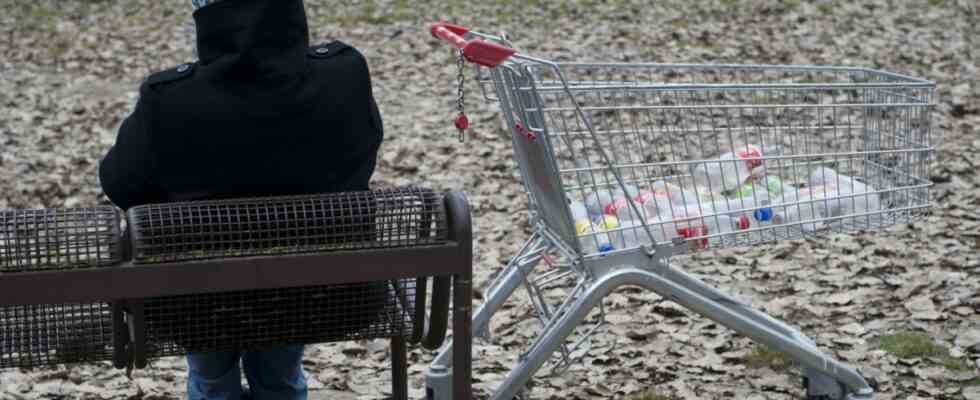Rain and autumnally cool – the weather forecast for Lichtenfels in Upper Franconia sounds pretty bad in the next few days. Or to put it another way: the heating season begins. Beate Ehl, head of the Caritas advice center, will have a lot of work to do, although not immediately because most of the utility bills have not yet been sent out. But something is brewing, and she also senses it when she describes the mood of her clientele: “Most of them are sitting there like rabbits in front of a queue. They’re terrified and don’t know at all how they’re going to pay for it.”
With every degree Celsius that the thermometer drops, a problem comes to the fore that will preoccupy people in Bavaria in the winter months like only the Corona pandemic did before: Hundreds of thousands will in all probability have their electricity, oil and Unable to pay gas bills. Ehl estimates that the EUR 300 lump sum from the state lasted maybe a month. Because it is precisely the socially disadvantaged who often live in houses that are as poorly insulated as a tent. And then? She doesn’t know either. Job centers and social welfare offices have not yet received any guidelines as to whether and how much of the horrendous energy costs would be covered.
In Lichtenfels, the approaching crisis hits a population that always has to keep an eye on the money anyway, especially since food prices have risen. “Our customers complain a lot that they can no longer afford the food,” says Ehl. The number of people in need who queue up for bread or vegetables at the Lichtenfels table once a week has grown from 90 to 160. But because of inflation, supermarkets and bakeries are calculating more and more precisely – there is less left over for the poor. However, Ehl observes that the need to survive has now reached far into the middle class. It is now also affecting craftsmen who have previously been able to make a good living from their profession.
Ulrike Mascher, state chairwoman of the VdK Bayern, knows that fear and insecurity prevail – especially among pensioners.
(Photo: Monika Keiler)
Politicians and social organizations in Bavaria appear alarmed and helpless in view of the development. Ulrike Mascher, state chairwoman of the VdK, observes, like Caritas consultant Ehl, that fear and insecurity prevail – especially among pensioners: “There are women who have already saved, turn off the light early and go to bed so that they have less energy consume.” Where else should you save? Mascher can’t help here either. The situation is opaque: “You can’t give good advice because you don’t know what to advise.” In any case, politicians must ensure that at least nobody is cut off from electricity and gas in winter.
But even Bavaria’s city council president Markus Pannermayr (CSU) cannot give such a guarantee. The Lord Mayor of Straubing reports that the public utilities have just increased the price of gas by 61 percent – according to him, further price increases cannot be ruled out. A third of the customers have decided to increase the advance payments, the rest have to be prepared for a hefty additional payment. Pannermayr is in favor of setting a price cap for electricity and gas quickly. A certain amount of consumption per person could therefore be purchased at a low rate. The municipal utilities would have to be reimbursed for the costs by the federal government. “It is crucial that you have clarity as to how this is to be done,” says Pannermayr.
Stefan Wolfshörndl, the head of workers’ welfare in Bavaria, could also make friends with capping the price of electricity and gas. There’s nothing wrong with that, he says. Nevertheless, he fears that the high energy prices in the winter would turn into a gigantic “job-creation program for debt counselors”. However, Wolfshörndl does not believe that the feared protests could take place. Rather, he expects the poor to withdraw and lose faith in society.
Social Affairs Minister Ulrike Scharf does not believe in the one-time payment of 300 euros.
(Photo: Stephan Rumpf)
The state government is now also concerned with the question of how the population can get through the winter without freezing and without bankruptcies. Bavaria’s Minister for Family, Labor and Social Affairs, Ulrike Scharf (CSU), criticizes the flat rate of 300 euros decided by the federal government as insufficient. “I think very little of the one-off payment. It won’t do us any good,” she says. Instead, Scharf proposes lowering the tax rates for low earners – a demand that is also supported by Landescaritas director Bernhard Piendl. “It’s the simplest instrument,” says Piendl, who also points out that rising energy costs are also a burden on Caritas. This must be taken into account when negotiating the care rates for homes.
However, income tax reform is the responsibility of the federal government. But what could the state government do in winter? Would Prime Minister Markus Söder have to launch his own aid program in the year of the state elections? Scharf leaves this open, but announces that developments will be monitored “very closely”. It is also about making sure that people can keep their jobs.
Neither politicians nor social organizations are currently able to predict whether the energy crisis will actually develop into a major social and economic crisis. However, Straubing’s mayor, Pannermayr, warns that care must now be taken not to frighten people every day. After all, it is now about necessary changes, also in the energy sector. This requires a basic trust that the future can be shaped.

